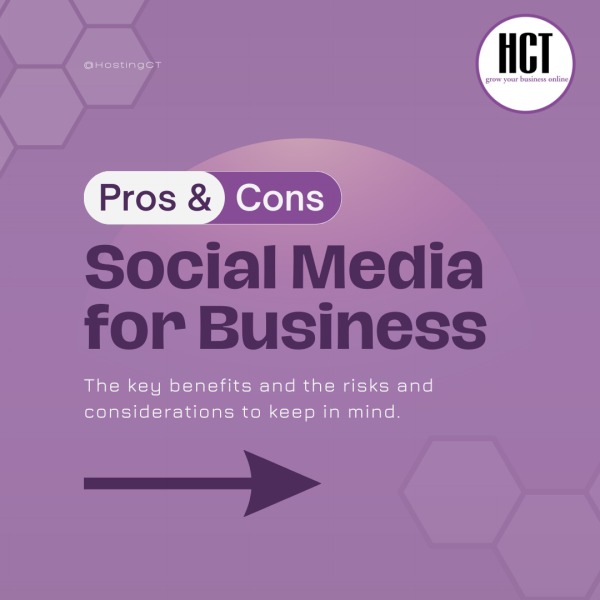The Pros and Cons of Social Media for BusinessFeb192024

Social media has become an integral part of business marketing and customer engagement over the last decade. Platforms like Facebook, Twitter, Instagram and LinkedIn offer new opportunities for brands to connect with their target audience. However, social media also comes with its challenges and potential downsides that businesses need to be aware of. In this article we’ll look at the key benefits social media marketing can bring for business, but also the risks and considerations to keep in mind.
Pros:
Increased Brand Awareness and Visibility
One of the biggest advantages of social media for business is the ability to increase brand visibility and awareness. By consistently posting engaging content on social platforms, brands can reach and get discovered by new audiences organically. Strategic use of hashtags, image content and video can dramatically improve the discovery of brands by relevant consumers.
Social also facilitates word-of-mouth marketing, with followers likely to share and retweet branded content they find valuable. This increases the reach and exposure of brands to networks outside their existing follower base.
Improved Customer Engagement
Social platforms facilitate two-way communication between brands and their audience. This allows customers to easily engage, ask questions and leave feedback that brands can respond to in real-time.Social media enables more personalized and authentic engagement at scale.
Businesses can also leverage social listening to monitor brand mentions and conversations to gain useful customer insights. This data can inform everything from customer service to new product development.
Lead Generation
The audiences that businesses can access on social media offer significant opportunities for lead generation. This includes driving site traffic through sharing links, as well as collecting contact details via lead ads and forms on social.
Tools like Facebook Lead Ads make it simple to collect user information such as email addresses and phone numbers directly from social platforms. The highly targeted nature of social advertising also allows businesses to promote content and offers to audiences more likely to convert.
Brand Humanization
Social platforms enable brands to showcase their "human" side through things like behind-the-scenes content and introducing key team members. This personalizes the brand in the eyes of consumers and helps forge emotional connections.
For example, consumers may engage more with video highlights of company events compared to generic promotional messages. Storytelling and humor can help brands be more relatable while expressing their core values.
Cons:
Time Consuming
While social media certainly provides new opportunities for business growth, it also requires a considerable time investment. Creating, managing and monitoring social media profiles, content and advertising campaigns takes both time and effort.
It’s important to ensure sufficient in-house resources are dedicated to social media to reap the full benefits. Many brands are also outsourcing social management to agencies to ensure consistency.
Information Overload
The sheer amount of information and noise on social media platforms can make it difficult for brand-related content to stand out. With more businesses recognizing the value of social engagement, competition for audience attention is high.
This requires brands to be even more strategic with content formats and messaging in order to cut through the clutter. A constant process of testing and optimization is key.
Negative Comments
One of the biggest risks with social media is negative comments and backlash that brands can face. Criticism and complaints on social platforms can spread quickly and impact public perception.
Moderating and participating in these public conversations in a thoughtful way is critical. Brand policies and crisis management plans need to encompass how to address negativity or misinformation on social channels.
Low Conversion Rates
While social platforms grant access to broad audiences, converting those audiences into customers can still be a challenge. Clicks and engagement don’t necessarily translate into sales conversions.
Success metrics beyond vanity metrics like likes and shares are crucial. Brands need to monitor the customer journey from discovery to conversion to fully optimize social media’s business impact.
When used strategically, social media offers powerful opportunities for business growth through increased brand awareness, customer engagement and lead generation. However, the investment of resources required and potential downsides like negative comments also need to be factored in.
Overall, the benefits of social are compelling for brands focused on the long-term value. Success comes down to understanding core target audiences, implementing policies to address risks, and measuring results based on clear conversion metrics. Social media should be viewed as a channel to develop relationships that eventually drive business value beyond just community size and engagement.
If managing social media seems daunting based on the time and effort required, consider partnering with a social media marketing agency like HostingCT. Our team can handle managing your brand's social media presence and strategy, allowing you to focus on other aspects of your business. With expertise across major platforms, HostingCT can help you maximize the benefits of social media marketing while minimizing the risks. Contact us today to learn more about our social media services.
Return





